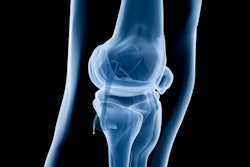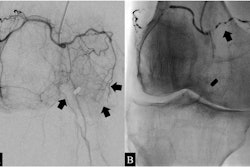MRI shows that injections of mesenchymal stem cells can improve clinical symptoms of patients with knee osteoarthritis and may result in early cartilage regeneration, according to research delivered November 30 at RSNA in Chicago.
A group led by first author Hossein Ghanaati, MD, of Tehran University of Medical Sciences in Iran, presented a study demonstrating that the approach significantly reduced pain in patients, with MRIs suggesting regeneration of the affected knee cartilage.
“What we can confidently state is that the progression of the disease has completely halted, and there are no MRI findings indicating disease progression,” Ghanaati said.
Osteoarthritis is among the most common destructive joint diseases, with an estimated 6% of men and 18% of women suffering from the disease globally. Few effective treatments are available other than medical therapy for pain control, Ghanaati noted.
Mesenchymal stem cells are multipotent stem cells found in bone marrow and are being used in labs around the world to make and repair skeletal tissues, such as cartilage, bone, and the fat found in bone marrow. In this study, the group hypothesized that injecting these cells into knee joints could serve as an intervention to treat patients.
In a preliminary trial, the group treated 30 patients (27 women and three men, mean age 61 years old) with moderate to severe knee osteoarthritis. In each patient, clinicians injected a solution of stem cells (70 million allogeneic cells) into the genicular arteries, a network that supplies blood to structures around the knee.
All of the patients were admitted for one day following the procedure. MRIs of patients’ knees were acquired prior to the procedure and at one, six, and nine months after, while pain, stiffness, and physical function were assessed using WOMAC (Western Ontario and McMaster Universities Osteoarthritis Index) patient questionnaire scores.
According to the findings, the technical success rate of the procedure was 100%. WOMAC scores for patients over 55 years old (n = 16) dropped from 32.63 prior to the intervention to 7.69 nine months later; WOMAC scores dropped for patients under 55 years old (n = 14) from 25.14 to 3.36.
“Patient symptoms improved significantly,” Ghanaati said.
In addition, the MRIs revealed small mean increases in the cartilage of the knee – for instance, an increase of 0.84 millimeters to 0.96 millimeters on axial views of the patella, according to the results.
“The MRIs indicated some cartilage regeneration. However, it remains unclear whether this represents true regeneration, edema, or even inflammation due to cartilage regeneration,” Ghanaati said.
While further research is needed to explore whether intragenicular artery injection of mesenchymal stem cells can regenerate cartilage, the study clearly indicates the approach significantly reduces pain in patients after nine months, he said.
“This procedure can be regarded as a substantial advancement in pain management for patients with knee osteoarthritis,” Ghanaati concluded.




















